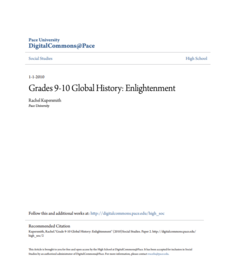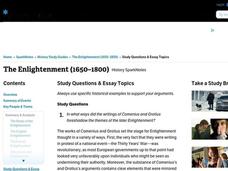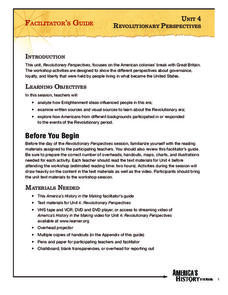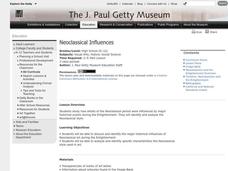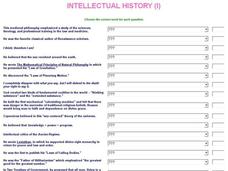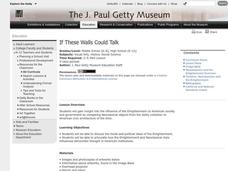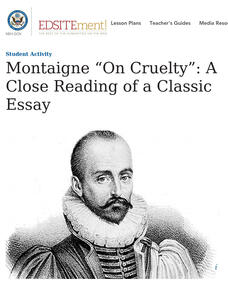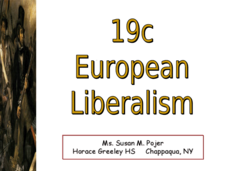Curated OER
Why Do Governments Exist? Locke, Hobbes, Montesquieu, and Rousseau
Here is a great secondary source reading that includes the primary ideas and philosophies of the famed Enlightenment philosophers: Thomas Hobbes, John Locke, Charles Montesquieu, and Jean-Jacques Rousseau. In additional to discussing...
Pace University
Global History: Enlightenment
The core ideas of the Enlightenment—reason, knowledge, and freedom—represented a rebellion against the despotic control of absolute monarchs. As part of the study of the movement, class members assume the voice or either a monarch or an...
Curated OER
The Age of Reason and Enlightenment
A presentation that truly covers the age of reason and enlightenment. Nearly every facet, event, and key player in 18th Century Age of Enlightenment is covered. The information is clear, easy to follow, and lends itself well to note...
Curated OER
The Enlightenment in Europe: Ch 22
Why study European Enlightenment? Because our governing forefathers and constitution were shaped by their words and philosophies. Presented here are facts and achievements of 8 different figures from the enlightened era. Also included is...
Curated OER
The Enlightenment: Matching #5
The enlightenment was a time of growth for parts of the world, and its spirit inspired future generations. Learners match ten descriptions to the proper person or item definitive of the enlightenment.
Curated OER
The Enlightenment: Matching Activity 4
Just finished reading about the 17th century and the period of Enlightenment? Use this helpful activity that covers the people and events your class has just read about. Learners can use this resource to match ten different Enlightenment...
Curated OER
The Enlightenment (1650–1800)
In this online interactive history worksheet, learners respond to 9 short answer and essay questions about the Enlightenment. Students may check some of their answers on the interactive worksheet.
Curated OER
Four Enlightenment Thinkers
Students examine lives, philosophies, and political beliefs of four Enlightenment Thinkers: Baron de Montesquieu, Jean-Jacques Rousseau, Thomas Hobbes, and John Locke. Students then work with partner to write short speech from...
Curated OER
Unit 12: Enlightenment and French Revolution
In this Enlightenment lesson, students respond to 34 short answer questions about John Locke, Thomas Hobbes, Baron de Montesquieu, Jean Jacques Rousseau, Voltaire, Denis Diderot, and Mary Wollstonecraft.
Curated OER
People of the Enlightenment -1600s & 1700s
In this people of the Enlightenment study guide worksheet, students read the notes provided regarding Locke, Hobbes, Rousseau, Montesquieu, and Voltaire.
Annenberg Foundation
Revolutionary Perspectives
Life, liberty, and the pursuit of happiness. Learners go to the heart of the causes of the American Revolution. Examining political cartoons, Enlightenment documents, and firsthand accounts, they present their ideas and reflective...
Curated OER
The Enlightenment
For this online interactive world history worksheet, students answer 20 fill in the blank questions regarding the Enlightenment. Students may submit their answers to be scored.
Curated OER
The Spread of Enlightenment Ideas
Looking for a simple and straightforward reference on the Enlightenment for your young historians? Check out this list of key terms and important figures from the period, followed by a traditional assessment where your learners will be...
Curated OER
How Man Negotiates Away His Natural Freedom
Students recognize that our legal-political system hasdeveloped through a process of moving from philosophical ideals to compromised working models. They apply John Locke's views to the development of U.S. political theory and systems.
Curated OER
Locke, Rousseau, the "State of Nature," and the Social Compact
In this Enlightenment worksheet, high schoolers read a paragraph and visit the noted Web sites to find the information to respond to 10 short answer questions about the philosophy and philosophers of the era.
Curated OER
Quotes by Hobbes, Locke, Montesquieu, Rousseau, and Voltaire
In Enlightenment quotations study guide worksheet, students read quotations and identify the speakers as Hobbes, Locke, Montesquieu, Rousseau, Peter the Great, Copernicus, Louis XIV, Galileo, Harvey, Kepler , Frederick the Great, or...
Curated OER
Politics and Leadership
Students research a historic leader and analyze how a philosopher's writings influenced the ruler in an essay. In this philosophy of government lesson plan, students view a video and participate in a class discussion on how great...
Curated OER
Neoclassical Influences
Students analyze neoclassical art. In this art history lesson, students listen to their instructor present a lecture regarding the details of the art produced during the Enlightenment.
Curated OER
Intellectual History
In this online interactive world history worksheet, students answer 22 matching questions regarding the Enlightenment. Students may submit their answers to be scored.
Curated OER
A Rising People: Ben Franklin and the Americans
Students examine the Enlightenment Era and its philosophies, including philosophers. Students gain an understanding concerning what they new science was and what it led to through a series of lessons and a PowerPoint. the end by writing...
Curated OER
If These Walls Could Talk
Students explore Enlightenment and Neoclassical art. In this visual arts lesson, students compare and contrast images of architecture from both styles. Students create visual art designs that feature the ideals of the Enlightenment.
National Endowment for the Humanities
Montaigne “On Cruelty”: A Close Reading of a Classic Essay
An excerpt from Michel de Montaigne's essay "On Cruelty" provides advanced readers an opportunity to polish their close reading skills. Scholars read the passage twice and then respond to the provided questions.
Curated OER
19c European Liberalism
If you'd like to prompt some great discussions in your history class, this presentation will surely get your class talking. Addressing 19th century liberalism in Europe (including influences from England, France, America, and Ireland),...
iCivics
Why Government?
Why do people create governments? Where did we get our ideas about government? This is a fantastic introductory instructional activity for your American government class that begins by reviewing the philosophies of Thomas Hobbes and John...



